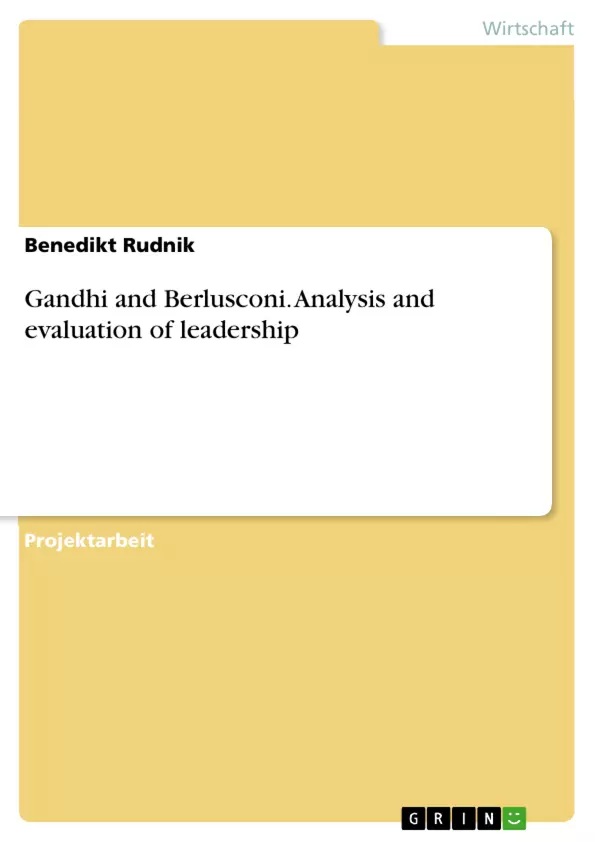This final project applies the content of the Business Leadership module on real-world situations.
Two chosen leaders (Mahatma Ghandi and Silvio Berlusconi) are analyzed and compared. Further personal notes and articles are reviewed in order to analyze and evaluate various concepts of leadership.
Inhaltsverzeichnis
- Introduction
- Analysis and evaluation of Leader #1 – Gandhi
- Mohandas (Mahatma) Gandhi
- Charismatic Leadership
- Authentic Leadership
- Analysis and evaluation of Leader #2 – Berlusconi
- Silvio Berlusconi
- Toxic Leadership
- Followers Perception of Leadership
- Comparison of the Leaders
- Cultural Aspects of Leadership
- Summary of Significant Findings and Perspectives from Journal Entries
- Introverted vs. Extroverted Leaders
- Technology and Leadership
- Start-Up Business and Leadership
- Analysis and Evaluation of Journal Entries to Chosen Leaders
- Jack Welch
- Richard Branson
Zielsetzung und Themenschwerpunkte
Dieses Abschlussprojekt des Business Leadership-Moduls zielt darauf ab, die wichtigsten Inhalte des Moduls auf reale Beispiele anzuwenden. Daher werden die Persönlichkeiten von Gandhi und Silvio Berlusconi in Bezug auf ihre Führungsqualitäten analysiert. Darüber hinaus beleuchten einige persönliche Erkenntnisse besondere Herausforderungen für Führungskräfte. Abschließend werden zwei öffentliche Führungspersönlichkeiten und ihre Darstellung in der wissenschaftlichen Literatur diskutiert. Zusätzlich wird dieses Projekt von einem persönlichen Journal begleitet, das während des Moduls geschrieben wurde.
- Analyse und Bewertung von Führungspersönlichkeiten anhand von realen Beispielen (Gandhi und Berlusconi)
- Erforschung der Konzepte von charismatischer Führung, authentischer Führung und toxischer Führung
- Untersuchung der Auswirkungen von Kultur auf Führungsverständnis und -verhalten
- Bewertung des Einflusses von Technologie auf Führung und Teamarbeit
- Bedeutung von Führung in Start-Up-Unternehmen und Herausforderungen für Führungskräfte in dieser Phase
Zusammenfassung der Kapitel
- Introduction: Das Projekt soll die Erkenntnisse des Moduls an realen Beispielen anwenden. Analysiert werden die Führungsqualitäten von Gandhi und Berlusconi.
- Analysis and evaluation of Leader #1 – Gandhi: Gandhi wird als transformationaler und authentischer Führer beschrieben, der durch seinen Einsatz für Moral und soziale Veränderung Millionen von Menschen inspirierte.
- Analysis and evaluation of Leader #2 – Berlusconi: Berlusconis Führungsstil wird als toxisch eingestuft, da er durch mangelnde Integrität, Arroganz und rücksichtsloses Verhalten geprägt war.
- Comparison of the Leaders: Während Gandhi als charismatischer und transformationaler Führer gilt, der durch seine authentische Haltung Millionen von Menschen inspirierte, wird Berlusconis Führungsstil als toxisch eingestuft, da er egozentrisch und rücksichtslos war.
- Cultural Aspects of Leadership: Die Kultur hat einen großen Einfluss auf die Wahrnehmung von Führungsqualitäten. Es wird gezeigt, wie verschiedene Kulturcluster unterschiedliche Führungsstile favorisieren.
- Summary of Significant Findings and Perspectives from Journal Entries: Die Journal-Einträge beleuchten verschiedene Aspekte der Führung, darunter der Einfluss von Introversion und Extroversion, die Bedeutung von Technologie und Führung in Start-Ups.
- Analysis and Evaluation of Journal Entries to Chosen Leaders: Die Journal-Einträge analysieren die Führungsstile von Jack Welch und Richard Branson.
Schlüsselwörter
Die zentralen Themen des Texts sind Führung, Charisma, Authentizität, Toxizität, Kultur und Technologie. Es werden verschiedene Führungsstile wie charismatische, transformational und toxische Führung analysiert. Der Text untersucht auch die Bedeutung von Kultur für die Wahrnehmung von Führungsqualitäten und die Herausforderungen, die sich durch die zunehmende Bedeutung von Technologie für Führungskräfte ergeben.
Häufig gestellte Fragen
Welche Führungspersönlichkeiten werden in dieser Arbeit verglichen?
Die Arbeit vergleicht Mahatma Gandhi und Silvio Berlusconi als Beispiele für unterschiedliche Führungsstile.
Wie wird Gandhis Führungsstil charakterisiert?
Gandhi gilt als Paradebeispiel für charismatische und authentische Führung, die auf Moral und sozialer Veränderung basiert.
Was versteht man unter "toxischer Führung" bei Berlusconi?
Berlusconis Stil wird als toxisch eingestuft, da er durch mangelnde Integrität, Arroganz und rücksichtsloses, egozentrisches Verhalten geprägt war.
Welchen Einfluss hat die Kultur auf die Führung?
Die Arbeit zeigt, dass verschiedene Kulturcluster unterschiedliche Erwartungen an Führungskräfte haben und bestimmte Stile favorisieren.
Welche Rolle spielt Technologie für moderne Führungskräfte?
Technologie verändert die Teamarbeit und stellt Führungskräfte vor neue Herausforderungen in der Kommunikation und Koordination.
Was sind die Besonderheiten von Führung in Start-Ups?
In der Start-Up-Phase sind Führungskräfte mit hoher Dynamik und dem Bedarf an schneller Anpassungsfähigkeit konfrontiert.
- Quote paper
- Benedikt Rudnik (Author), 2014, Gandhi and Berlusconi. Analysis and evaluation of leadership, Munich, GRIN Verlag, https://www.grin.com/document/321391



